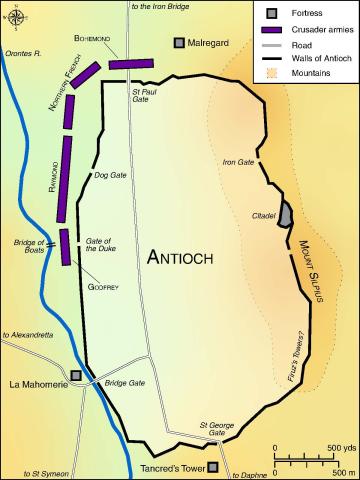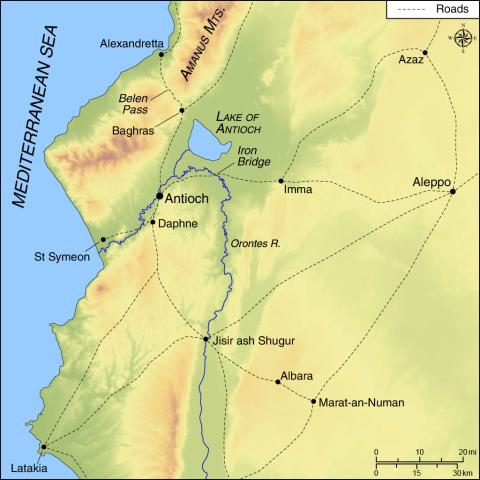The Foraging Battle
[5.13.1] Congregātī sunt itaque omnēs māiōrēs nostrī, et ōrdināvērunt concilium, dīcentēs: “Faciāmus castrum in vertice montis Maregart, quō sēcūrī atque tūtī possīmus esse ā Turcōrum formīdine.” Factō itaque castrō atque mūnītō, omnēs māiōrēs illud invicem cūstōdiēbant.
Iamiam coeperant frūmentum et omnia nūtrīmenta corporum nimis esse cāra ante Nātāle Dominī. Forās penitus nōn audēbāmus exīre, nihilque penitus in terrā Chrīstiānōrum invenīre poterāmus ad edendum. In Saracēnōrum namque terram nēmō intrāre audēbat nisi cum magnā gente. Ad ultimum statuērunt nostrī seniōrēs concilium, ōrdinandō quāliter regerent tantās gentēs. Invēnērunt in cōnsiliō, ut ūna pars nostrī īret dīligenter attrahere stīpendium, et ubīque cūstōdīre exercitum; alia quoque pars fīdūciāliter remanēret cūstōdīre hostem. Boamundus dēnique dīxit: “Seniōrēs et prūdentissimī mīlitēs, sī vultis et bonum vōbīs vidētur, ego erō cum Flandrensī comite, itūrus cum eō.”
[5.13.2] Celebrātīs itaque glōriōsissimae solemnitātibus Nātīvitātis, in Diē Lūnae, secundā scīlicet fēriā, ēgressī sunt illī, et aliī plūs quam vīgintī mīlia mīlitum et peditum, ac sānī et incolumēs intrāvērunt terram Saracēnōrum. Congregātī quippe erant multī Turcī et Ārabēs et Saracēnī, ab Hierusalem et Damascō et Aleph et ab aliīs regiōnibus, quī veniēbant fortitūdinem Antiochīae dare. Audientēs itaque istī Chrīstiānōrum gentem conductam esse in illōrum terram, īlicō praeparāvērunt sē ad bellum contrā Chrīstiānōs; atque summō dīlūculō vēnērunt in locum ubi gēns nostra erat in ūnum.
notes
vocabulary
5.13.1
forās: outside
regō regere rexī rectum: to direct the activities of (OLD 7); to take care of, provide for
stīpendium –(i)ī, n.: wages, salary (CL); supplies (ML)
hostis –is, f.: host, army (ML)
ubique: everywhere (OLD 2)
5.13.2
Nātīvitas –atis, f.: the Birth; Christmas (ML)
īlicō: on the spot; then and there, at once


